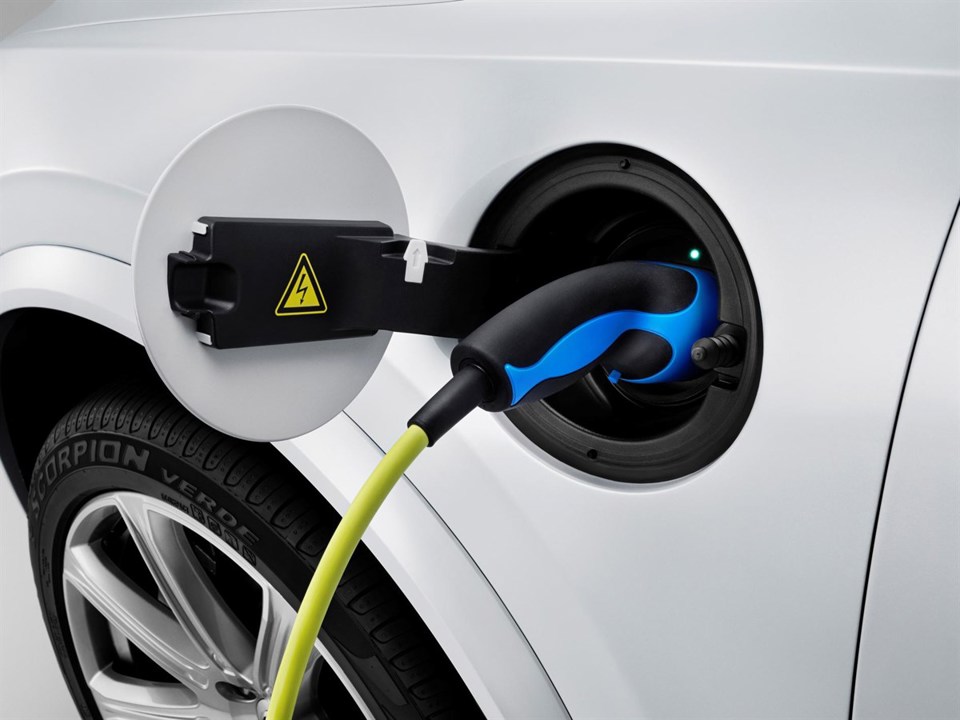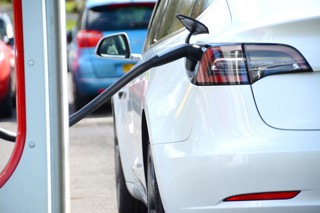Carmakers have been rushing to cut electric vehicle (EV) prices, so they remain eligible for the plug-in car grant (PiCG).
The available funding has been reduced from £3,000 to £2,500 and now excludes models that cost more than £35,000. Previously the cap was £50,000.
It means, for example, the Tesla Model 3, with prices starting from £42,500, and the new Ford Mustang Mach-E, which is priced from £40,295, will now not qualify for the incentive.
However, Nissan, Vauxhall, Peugeot, BMW and Hyundai, which had electric cars priced just above the new £35,000 threshold, have reduced vehicle costs to remain eligible for the grant.
Ford said the Government decision to cut the grant, meaning that the Mustang Mach-E now misses out, was disappointing. “Robust incentives - for both purchase and usage - that are consistent over time are essential if we are to encourage consumers to adopt new technologies, not just for all-electrics but other technologies too like PHEVs (plug-in hybrid electric vehicles) that pave the way to a zero-emissions future,” a Ford spokesman explained.
EV PRICE CUTS
Citroën was the first carmaker to react to the changes, cutting the cost of its e-C4 Shine Plus so all versions of the electric car remain eligible.
The e-C4 Shine plus previously had an on-the-road price of £35,545 but is now priced from £34,995 making it eligible for the £2,500 grant.
Citroën UK managing director Eurig Druce said he was “disappointed” the grant had been reduced. “For this period of transition to be a success and for electrification targets to be met, both the industry and consumers need clearer longterm guidance and support on how we will get there,” he added.
Announcements of price cuts for electric models from fellow Stellantis brands Peugeot and Vauxhall quickly followed.
"It was important for us, in light of the changes to the PiCG, to provide our customers with some additional saving," Ashley Andrew, Hyundai Motor UK
Peugeot revised pricing for all its e-2008 models and enhanced deposit contributions for the e-208 range in response.
The manufacturer cut e208 list prices by £450, to ensure every Active Premium, Allure and Allure Premium derivative remains eligible. Prices before PiCG for the Active Premium now start from £30,730, while Allure models start from £34,430 and Allure Premium variants from £34,880.
Vauxhall, meanwhile, revised the pricing across the entire Mokka-e range to ensure all derivatives remain eligible. Prices for the Mokka-e SE Premium now start from £33,040, while the Mokka-e Launch Edition starts from £34,995.
To ensure the Vivaro-e Life qualifies for the new plug-in grant, Edition models have also been reduced by more than £2,000, with prices starting from £34,995.
The Vivaro-e Life Combi will be the same specification level as the Edition model and will also start from £34,995. The Corsa-e is already priced below the grant threshold.
Julie David, managing director of Peugeot UK, said the plug-in car grant had helped many make the switch to EVs, which is why she is keen to ensure its plug-in cars remained eligible for the grant.
Vauxhall managing director Paul Wilcox added: “We believe in making sure our vehicles are as accessible as possible to the greatest number of people, especially when it comes to zero emissions-in-use motoring.”
MAINTAINING EV DEMAND
The biggest reduction has come from BMW, which slashed the pricing of its i3 electric car to ensure customers can still take advantage of the grant. The base i3 is now priced from £33,805 (before the grant), a reduction of £5,880.
Sportier i3s models have been cut even further, with prices starting at £34,805 before incentives – a saving of almost £7,500. BMW says there are no changes to the car’s specification levels. All models come with heated seats, parking sensors, LED lights and sat-nav as standard.
With some models falling outside of the new threshold, Nissan has decided to cut prices for the 40kWh and 62kWh versions of the Leaf.
Its 40kWh models would have still qualified, being less than the £35,000 threshold, but prices have still been reduced by up to £1,350, with pricing now starting from £28,495 (excluding the grant).
The 62kWh Tekna and Connects variants, however, would not have qualified for the grant, so have had prices cut by up to £2,765. Tekna is now priced from £34,945 and Connecta from £32,945, without the grant applied.
The Kona Electric 64kWh Premium now costs £34,995, while Kona Electric 39KWh prices have also been reduced with the SE Connect now costing £30,395 and Premium at £31,745.
The range-topping Kona Electric Premium SE is the only electric Hyundai model not to be eligible for the grant, with a price of £37,145. The Ioniq Electric range sees prices cut for the Premium model to £32,995 and the Premium SE to £34,995.
Ashley Andrew, managing director of Hyundai Motor UK, said: “When it comes to electric vehicles, cost is a big consideration, so it was important for us, in light of the changes to the PiCG, to provide our customers with some additional savings which, we hope, will help to maintain demand for zero-emission vehicles.”
TAX ADVANTAGES REMAIN
The changes to the electric car grant, which were introduced without warning, have attracted widespread criticism from the fleet industry.
Fleet trade and training body, the Association of Fleet Professionals (AFP), labelled it “too soon” to cut support for EVs.
Nick Hardy, sales director at Ogilvie Fleet, was not surprised by the changes, but told Fleet News it was “unbelievable” to give so little notice.
“Not surprisingly, those manufacturers that were close to the new limit have taken the opportunity to ‘re-price’ some of their cars and get them back to a more sensible point,” he said.
However, he added: “Some of that has been funded by lessening discounts so the net cost of the metal (before the grant) hasn’t necessarily altered. Drivers won’t complain though, as the P11D has also come down as a result.”
Hardy believes financial support is still key and will be needed for some time yet, but low benefit-in-kind (BIK) tax rates are driving an “everincreasing” fleet demand for EVs.
“We haven’t seen any form of reduction in the demand of EVs, though there has, of course, been some change in the types of vehicles being asked for or allowed,” he said.
“A number of the cars that were in the £35,000-£50,000 bracket have fallen off many client’s policies now, especially those nearer to £50,000.”
By allowing drivers to contribute or upgrade, however, Ogilvie Fleet reported that those EVs priced above the new threshold are still in demand as – even with a contribution from the employee – the net cost to the driver is far lower than taking a petrol or diesel equivalent.
Dylan Setterfield, head of forecast strategy at Cap HPI, says that there are still “multiple incentives” in place for fleets.
He believes the scale of the capital allowances and Class 1A National Insurance Contributions (NICs) benefits mean most companies will still want their drivers to be able to take advantage of low BIK rates and are likely to adjust company car bandings to compensate for vehicles which now fall outside the PiCG subsidy.
“Although many of those who were considering quotes before March 18 will now be back to square one, there is probably less impact towards the previous threshold of the £50,000 list price as monthly lease rental bandings will tend to be wider,” he said.
LIST PRICE ‘VACUUM’
Setterfield suggests it is possible the grant changes will result in a list price ‘vacuum’ between £35,000 and £40,000 in the same way that one developed between £50,000 and £55,000 under the previous subsidy.
“At the other end of the price bracket, we expect some list price inflation for those vehicles which were previously constrained by the £50,000 limit and this could benefit used values in a small number of cases,” he said.
“The biggest factor that is likely to influence used car supply and demand in the future is the availability of supply of new cars.
“Manufacturers may be tempted to divert supply to other, more profitable markets which are applying larger and increasing incentives, rather than build vehicles for the UK market.”
However, he says that, although the reduced speed of adoption would be expected to have a positive impact on used values due to reduced supply, used car demand in this situation is also stimulated by the new car demand.
“More cars on the road drive increased awareness and also fuel increases in used car demand,” he explained. “The situation is complex and further changes can be expected in March 2022, but our current expectation is that there is no overriding impact on used values in either direction.
“We expect BEVs to continue to reduce in price by more than internal combustion engine cars, but to retain a significant premium for the foreseeable future, partly due to the intrinsic value of the battery itself.”
Setterfield says there will be a lot of variation on an individual model level, but, broadly, he sees the impact on used values as a result of the PiCG changes as neutral.
Ashley Barnett, head of consultancy at the UK's largest vehicle leasing company Lex Autolease, says that the overnight PiCG cut gave businesses and individuals no time to react. Read more here.























Login to comment
Comments
No comments have been made yet.